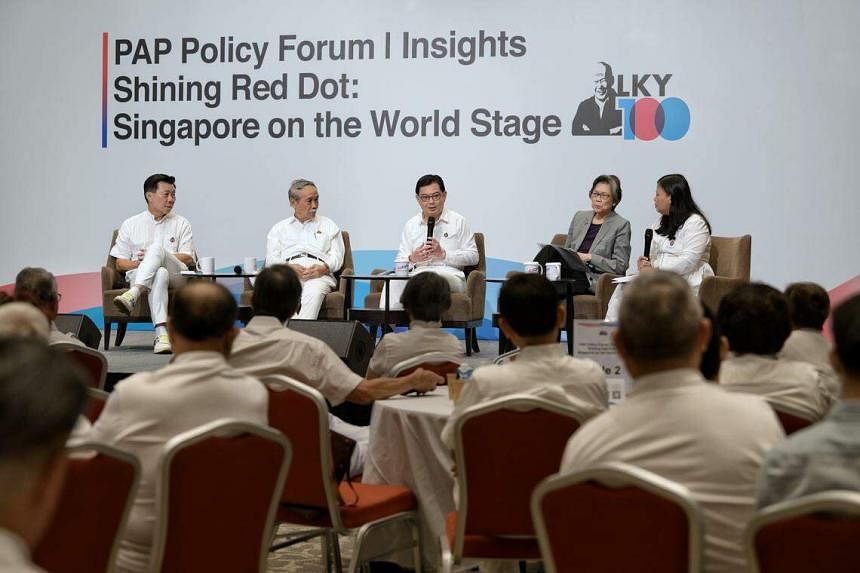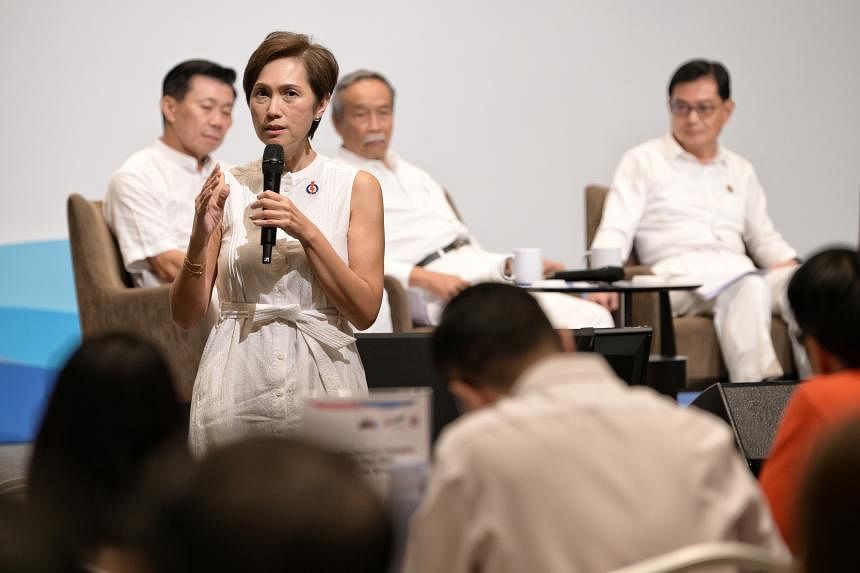SINGAPORE – To manage the Republic’s engagement with other parts of the world, Singaporeans believe that the 4G leadership should prioritise making the nation relevant to key partners and building coalitions of support.
Nearly 75 per cent of more than 1,300 respondents felt that this priority was at least “moderately important”, according to an online survey conducted by the PAP Policy Forum (PPF) from Nov 24 to 29.
On Dec 2, Minister for Communications and Information Josephine Teo revealed the survey results at a PPF dialogue at The Star Performing Arts Centre.
Referring to late Minister Mentor Lee Kuan Yew, she said: “The survey questions were based on a selection of Mr Lee’s core beliefs – how he thought about Singapore’s international engagements, why he did what he did and the consequences that he believed would ensue as a result.”
The dialogue was the last in a three-part series by the PPF to commemorate the birth centenary of Mr Lee, Singapore’s founding prime minister, and mark PPF’s effort to drive change for the country’s future.
The PPF serves as a platform for People’s Action Party members to understand policies and strengthen trust with their leaders.
Mrs Teo added that survey respondents from the general public, including PAP members, were asked to rank three factors they believe contributed most to Singapore’s current international standing.
These factors were “recognising the limitations of being small”, “leapfrogging the region and differentiating ourselves” and “making ourselves relevant to key partners and building coalitions of support”.
About six in 10 respondents noted that recognising the limitations of being small was at least “moderately important” in contributing to Singapore’s global standing.
“In truth, all three factors are related. It is because we recognise the limitations of being small that we choose to leapfrog the region and differentiate ourselves. And in doing so, our aim must be to make ourselves relevant to the world and to build coalitions of support to ensure that our national interests are always upheld and that we never become collateral damage,” said Mrs Teo, who is also the PPF adviser.
Deputy Prime Minister Heng Swee Keat, addressing 310 participants, including activists and retired MPs, at the dialogue, laid out the governing principles that Mr Lee and the first generation of PAP leaders had established for Singapore.
“Principles hold a certain timelessness but they cannot be applied rigidly,” he noted.
“Mr Lee always asked: ‘Does it work? If it doesn’t work, toss it out, try another one.’ Such was his humility and willingness to adjust his views when circumstances changed,” DPM Heng said.
DPM Heng noted that discipline and a focus on the long term are required. “Compared to larger, more resourced states, our margins are narrow. We may not have that capacity to bounce back. So this is a critical leadership responsibility – to continuously examine, refresh and update in order to keep Singapore shining and successful,” he added.
In November, it was announced at PAP’s biennial convention that Deputy Prime Minister Lawrence Wong will lead the party in the next general election, taking over the reins from Prime Minister Lee Hsien Loong ahead of the polls.
Highlighting three key ideas to keep Singapore relevant, DPM Heng said it must remain cohesive, harmonious and successful.
“How do we retain and grow trust? We must continuously uphold Mr Lee’s commitment to build a better Singapore, and enable Singaporeans to have better lives. In this endeavour, some things remain unchanged, while others may need to be refreshed and re-examined,” he added.
He said the importance of economic growth to expand Singapore’s resources, creating good jobs and uplifting Singaporeans, remains unchanged.
“It is more difficult because of today’s geopolitics, yet also more optimistic because of the possibilities that science and technology could offer. With disruptions becoming more frequent and intense, we must prepare Singaporeans well, by adjusting our education and training support ecosystem,” he noted.

Singapore must also confidently engage the world to secure the nation’s interest and maintain its relevance, said DPM Heng.
“So just as Mr Lee and our earlier generations of leaders have created space and grown mindshare for Singapore, we too must harness our creativity and collective will to strengthen linkages with, and contribute constructively to the world,” he added.
Addressing his final key point to keep Singapore relevant on the world stage, DPM Heng said: “As a people, we must continue to be outward-looking and striving, to keep Singapore shining brightly.”
He added that there are good job opportunities here, and Singaporeans’ housing and healthcare needs are taken care of.
“It is not unfair to think that perhaps we have arrived and can afford to slow down or choose differently. But we must remember that the natural path for a small island state is to be passed over if we fail to keep up or remain relevant,” said DPM Heng.
Singaporeans must thus look outwards to learn from the best, he added.“At the same time, we must continue to welcome those who share in our values and wish to contribute to Singapore. Together, we can deepen our ecosystem, grow opportunities and strengthen our position as a vibrant and trusted node,” he said.


